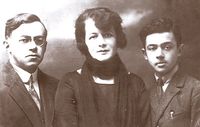زئف جابوتنسكي
زئڤ جابوتنسكي Ze'ev Jabotinsky | |
|---|---|
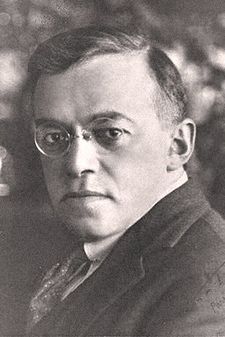 زئڤ جابوتنسكي | |
| وُلِدَ | ڤلاديمير إيڤگنيڤيچ ژابوتينسكي 18 أكتوبر 1880 |
| توفي | 4 أغسطس 1940 نيويورك، الولايات المتحدة |
| المثوى | 1940–1964: مقبرة نيو منتيفيوري، نيويورك، الولايات المتحدة 1964–الآن: جبل هرتسل، القدس، إسرائيل 31°46′26″N 35°10′50″E / 31.77389°N 35.18056°E |
| القومية | روسيا |
| التعليم | القانون |
| المدرسة الأم | جامعة ساپينزا في روما |
| المهنة | صحفي، كاتب، قائد عسكري وناشط سياسي |
| عـُرِف بـ | تأسيس السياسات العلمانية اليمينية اليهودية (وفيما بعد الإسرائيلية)؛ زعيم بتار |
| الزوج |
حنا ماركوڤنا هالپرن
(m. 1907–1940) |
| الديانة | ملحد يهودي[2][3] |
زئڤ جابوتنسكي Ze'ev Jabotinsky ع.و.إ.ب. (بالعبرية: זאב ז'בוטינסקי; وُلد ڤلاديمير إيڤگنيڤيچ ژابوتينسكي (روسية: Влади́мир Евге́ньевич Жаботи́нский) (18 أكتوبر 1880 – 4 أغسطس 1940)، هو زعيم صهيوني ثوري، مؤلف، شاعر، خطيب، جندي، ومؤسس منظمة الدفاع الذاتي اليهودي في اوديسا. برفقة يوسف ترومپلدور، أسسا الفيلق اليهودي[4] التابع للجيش البريطاني أثناء الحرب العالمية الأولى وأسس لاحقاً عدد من المنظمات اليهودية مثل بيتار، هاتزوهار، وإرگون.
حياته
ولد ڤلاديمير في مدينة اوديسا لعائلة تنتمي إلى الطبقة الوسطى. تلقى تعليماً ديناً في صغره ولكنه سرعان ما ابتعد على اليهودية الأرثوذوكسية. درس القانون في سويسرا وإيطاليا.امتهن الصحافة تحت اسم ألتلينا لصحف تكتب باللغة روسية ثم باللغة اليديشية ومن باللغة العبرية.
النشاط الصهيوني في روسيا
بدأ جابوتنسكي نشاطه الصهيوني عام 1903 بحضور المؤتمر الصهيوني السادس، فاطلع على كتابات الصهاينة الأوائل مثل هرتزل وبنسكر كما تعرف إلى أوسشكين وبياليك، وكان من معارضي مشروع شرق أفريقيا كحل للمسألة اليهودية.
الحياة العسكرية
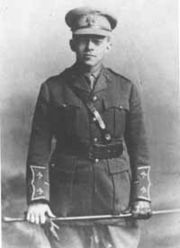
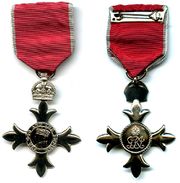
انتقل إلى اسطنبول حيث كان مسؤولاً رسمياً عن شبكة الصحافة الصهيونية بين 1909 و1911. يعد جابوتنسكي من أهم مؤسسي «الصندوق القومي اليهودي»، والفيلق اليهودي الذي شارك في الحرب العالمية الأولى إلى جانب بريطانيا وكان يظن أنه أحد العوامل الحاسمة في صدور وعد بلفور. كان جابوتنسكي يعتقد أن على اليهود يجب أن يساعدوا البريطانيين للاستيلاء على فلسطين التي كانت تحت الوصاية العثمانية لإنشاء موطن يهودي ففكر في قوة مسلحة يهودية وهي الفيلق اليهودي. تولى قيادة الكتيبة رقم 38 في الجيش البريطاني العام 1917 ورُفي إلى رتبة ليفتينانت وكان من أوائل الجنود الذين عبروا الأردن[5].
عندما انتهت الحرب العالمية الأولى، دعا إلى الاستمرار في التجنيد لصالح الكتائب العسكرية بحجة حماية المستوطنات في فلسطين، ولهذا اصطدم مع زعامة الحركة الصهيونية وعلى رأسها حاييم وايزمان، واعتبر جابوتنسكي أن توجه الصهيونية لين ومرن أكثر من اللازم[5]. على إثر عمليات اعتداء على الفلسطينيين شنتها الهاغاناه في نيسان 1920 في القدس تم إلقاء القبض عليه وحُكم عليه بالسجن مدة خمسة عشر عاماً مع الأشغال الشاقة في سجن عكا. أثار الحكم عليه ضجة واسعة في المستوطنات وخارج فلسطين ما دفع بعض القيادات الصهيونية إلى وضعه على رأس قائمة المرشحين لحزب أحدوت هعفودا استعداداً لانتخابات جمعية المندوبين الأولى، ولما أُفرج عنه من السجن في صيف 1920 إثر نيله عفواً عاماً تقرب من وايزمان وضُمّ إلى الإدارة الصهيونية العامة، وكان من بين الموافقين على التنازل عن المطالبة بالأردن، وهذا قبل اصدار تشرتشل لكتابه الأبيض سنة 1922 [5].
في عام 1921 أصبح عضواً في اللجنة التنفيذية للمنظمة الصهيونية العالمية ولكنه انشق عن المنظمة سنة 1923 بعد خلاف معها وأسس حركة بيتار سنة 1923 ثم أسس حزب الصهيونية التصحيحية سنة 1925 أحد أهم أحزاب اليمين الصهويني المطالب بإنشاء دولة يهودية تمتد ما بين النهرين. أثار هذا غضب حكومة الانتداب البريطانية التي قامت منعه من دخول فلسطين إلى اجل غير مسمى عام 1930 [5].
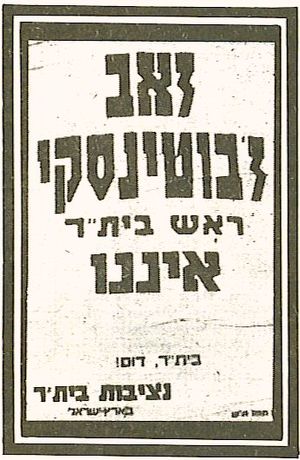
عارض جابوتنسكي بشدة خطة التقسيم التي عرضتها لجنة بيل عام 1937، ودعا إلى رفض الاكتفاء بإقامة (إسرائيل) على أرض فلسطين وحدها بل مدها إلى الأردن وصحراء سوريا.
النشاط الأدبي
الجدار الحديدي
في 4 نوفمبر و11 نوفمبر 1923 نشر جابوتنسكي مقالان يمثلان طريقة تفكير الصهيونية يوضحان الكثير من تصرفاتها. وينظر إلى المقالتين كأساس نظري اتبعه بنيامين نتنياهو وحكومته، تجاه الفلسطينيين والمفاوضات والحل السلمي.
المقال الأول الجدار الحديدي: نحن والعرب
نُشر في 4 نوفمبر 1923 الجدار الحديدي
استعمار فلسطين: يستحيل الاتفاق مع العرب حاليًا لكن الصهيونية يجب أن تتقدم.
من الجيد أن تبدأ المقالة بأكثر النقاط أهمية، لكن هذه المرة أجد أنه من الضروري البدء بمقدمة، وهي مقدمة ذات طبيعة شخصية. عندي سمعة بأني عدو العرب، الذي يريد طردهم من فلسطين وما إلى ذلك، وهذا غير صحيح – فمن ناحية عاطفية فموقفي تجاه العرب هو نفسه تجاه الشعوب الأخرى، اختلاف مع احترام. أما من ناحية سياسية فموقفي يحدده مبدئان: الأول، أجد أنه من المستحيل طرد العرب من فلسطين، وسيبقى دائمًا هنالك شعبان في فلسطين، وهذا لا بأس به بالنسبة لي، بشرط أن يصبح اليهود أغلبية. والثاني: أنا انتمي للمجموعة التي خططت لـ "برنامج هلنسكي"؛ برنامج الحفاظ على الحقوق الوطنية لكل القوميات التي تعيش في نفس الدولة، وعند التخطيط لذلك البرنامج، لم يكن في ذهننا فقط اليهود بل كل الشعوب في كل مكان، وأساسه هي المساواة في الحقوق. وأنا مستعد لأن أقسم وألزم أنفسنا وأبناءنا أننا لن نفعل شيئًا يناقض مبدأ الحقوق المتساوية، وأننا لن نحاول طرد أحد. وهذه اعتبرها عقيدة مسالمة، لكن هنالك مسألة أخرى تطرح نفسها، وهي هل من الممكن دائمًا تحقيق هدف مسالم باستخدام وسائل سلمية؟ للإجابة على هذا السؤال فالأمر لا يعتمد على موقفنا تجاه العرب، بل بشكل كلي على موقف العرب تجاهنا وتجاه الصهيونية. بعد هذه المقدمة لندخل إلى لب الموضوع.
اتفاقية طوعية أمر غير ممكن لا يمكن أن يكون هنالك اتفاقية طوعية بيننا وبين عرب فلسطين، لا اليوم ولا في المستقبل المنظور، ولا أقول ذلك لأنني أريد إيذاء الصهاينة المعتدلين، ولا أظن أنهم سيتأذون باسثتناء أولئك الذين ولدوا عميانًا، فقد أدركوا منذ زمن بعيد أنه من المستحيل أن يقبل عرب فلسطين طواعية بتحويل "فلسطين" من دولة عربية إلى دولة بأغلبية يهودية. لدى قرائي فكرة عامة عن تاريخ الاستعمار في دول أخرى، واقترح عليهم أن يأخذوا بعين الاعتبار جميع الأسبقيات التي يعرفونها، ليروا إن كان هنالك حالة استعمارية واحدة تم إنجازها بموافقة الشعب الأصلي، لا يوجد أي سباقة من هذا النوع. الشعوب الأصلية، متحضرة كانت أم غير متحضرة، قاومت بعنادة المستعمرين، بغض النظر إن كان المستعمرون متحضرين أم متوحشين. وسواء تعامل المستعمرون بطريقة نزيهة أم لا، لم يكن ليشكل أي فرق لدى الشعوب الأصلية. حملات كورتيز وبيزارو (حملات استعمارية إسبانية)، مثلما يذكرنا البعض بها، بالإضافة لأجددادنا مثل يوشع بن نون، تصرفوا مثل قطاع الطرق، بينما كان "الآباء الحجاج" الطليعة الاستعمارية لأمريكا الشمالية، أصحاب أخلاقيات عالية، ولم يريدوا إيذاء أي أحد، بمن فيهم الهنود الحمر، وآمنوا بصدق أنه يوجد متسع في البراري لأصحاب "الوجوه الشاحبة" (البيض) و"الجلود الحمراء" (ألهنود الحمر). مع ذلك فالسكان الأصليون قاتلوا بنفس الشراسة ضد المستعمرين الجيدين والسيئين. كل شعب أصلي، متحضر أم لا، يعتبر أراضيه وطنه الأم، ويعتبر نفسه السيد الوحيد على هذه الأرض، ويريد الحفاظ على هذه السيادة دوماً، وسيرفض الاعتراف بأي أسياد جدد، بل لن يعترف بأي شركاء في هذه الأرض.
العرب ليسوا أغبياء
وهذا ينطبق على جميع العرب. ويحاول دعاة السلام الصهاينة اقناعنا بأن العرب إما أغبياء يمكن خداعهم من خلال إخفاء أهدافنا الحقيقية، أو فاسدون بحيث يمكن رشوتهم من أجل التخلي عن مزاعمهم بالأحقية في فلسطين، مقابل مكاسب ثقافية واقتصادية. لا أقبل بهذه النظرة تجاه الفلسطينيين العرب، فرغم أنهم ثقافيًا خلفنا 500 عام، ولا يوجد لديهم قدرتنا على التحمل ولا تصميمنا، لكنهم علماء نفس جيدون مثلنا، وعقولهم مصقولة مثلنا. يمكننا إخبارهم ما نريد عن براءة أهدافنا، وإغراقهم بالكلام المعسول ونحاول جعلهم لقمة سائغة، لكنهم يعرفون ما الذي نريده، مثلما نعرف ما الذي لا يريدونه. لديهم الغيرة الفطرية على فلسطين، مثلما كان يشعر الأزتيك القدماء تجاه المكسيك القديمة أو السوكس (قبيلة من الهنود الحمر) تجاه براريهم. أما أن نتخيل، مثلما يفعل "محبو العرب" من الصهاينة، أنهم سوف يقبلون الصهيونية، مقابل المنافع المادية والمعنوية التي سيحضرها المستعمرون اليهود معهم، هو مجرد خيال طفوي، ويحمل في طياته ازدراء للعرب، وهذا يعني أنهم يحتقرون العرق العربي، عندما يعتبرونه مجموعة من الرعاع يمكن شراؤها وبيعها، وأنهم مستعدون للتخلي عن أرض أجدادهم مقابل سكة حديد جيدة. لا يوجد أي مسوغ لهكذا اعتقاد، قد نجد أفرادًا من العرب يأخذون الرشاوى، لكن هذا لا يعني أن عرب فلسطين كمجموع سيبيعون وطنيتهم التي يتمسكون بها بقوة، بل حتى سكان بابوا (جزيرة في المحيط الهادئ) لن يبيعوا وطنيتهم، فكل شعب أصلي في العالم يقاوم الاستعمار طالما لديه أدنى أمل بالتخلص من الاستعمار. وهذا ما يفعله العرب في فلسطين، وهذا ما سيستمرون بالقيام فيه ما دام هنالك بصيص أمل بأنهم يستطيعون منع تحويل "فلسطين" إلى "أرض إسرائيل".
الإدراك العربي
بعضنا يحاول اقناعنا بأن كل المشاكل مع العرب سببها سوء الفهم - العرب لم يفهمونا، وهذا السبب الوحيد لمقاومتهم لنا، وإن كان ممكنًا التوضيح لهم كم هي نوايانا طيبة، فإنهم سيمدون لنا أيدي الصداقة فوراً. وهذه القناعة لا أساس لها من الصحة، وثبت فشلها المرة تلو الأخرى، وأنا سأذكر حادثة واحدة فقط من عدة حوادث، وذلك قبل عدة سنوات عندما قام ناحوم سوكولوڤ باحدى زياراته الدورية إلى فلسطين، وتكلم في اجتماع عن مسألة "سوء التفاهم"، وقام بالإيضاح بأن العرب يرتكبون خطأ كبيرًا إن كانوا يعتقدون أن لدينا أي رغبة بحرمانهم من ممتلكاتهم أو طردهم من البلد، أو أننا نريد اضطهادهم، بل حتى أننا لم نطالب بحكومة يهودية في فلسطين لتنفيذ صك الانتداب. احدى الصحف العربية، وهي صحيفة الكرمل ردت عليه في ذلك الوقت، بمقال افتتاحي يقول "أن الصهاينة يفتعلون ضجة، ولا يوجد أي سوء فهم، وكل ما يقوله سوكولف عن النوايا الصهيونية هو حقيقي، لكن العرب يعرفون ذلك بدونه. بالتأكيد الصهاينة لا يفكرون الآن بطرد العرب من البلد، أو اضطهادهم، ولا يفكرون بحكومة يهودية، ومن الواضح أنهم يهتمون الآن بشيء واحد فقط – أن لا يعرقل العرب هجرة الصهاينة. بل إن الصهاينة أكدوا لنا أن الهجرة ستكون مقيدة باحتياجات الاقتصاد الفلسطيني، والعرب لم يشكوا في ذلك أبداً، وهي بديهية بدونها لن تكون هنالك هجرة".
لا يوجد "سوء تفاهم"
كاتب المقال الافتتاحي العربي كان مستعداً للاعتراف بأن فلسطين لديها قدرة عالية على الاستيعاب، وهذا يعني أن هنالك متسع لأعداد كبيرة من اليهود في البلد بدون طرد عربي واحد، وهنالك شيء واحد يريده الصهاينة، وهذا الشيء الوحيد لا يريده العرب، وهو أن يصبح عبر الهجرة، اليهود أغلبية بشكل تدريجي، ووقتها ستأتي الحكومة اليهودية تلقائياً، وسيصبح مستقبل الأقلية العربية معتمداً على النوايا الحسنة لليهود، ووضع الأقلية ليس بالشيء الجيد، واليهود أنفسهم لم يملوا من الإشارة إلى سوء وضعهم كأقليات، لذا لا يوجد أي "سوء تفاهم". الصهاينة يريدون شيئًا واحدًا فقط، الهجرة اليهودية، وهذه الهجرة اليهودية لا يريدها العرب. هذا التوضيح من كاتب المقال العربي منطقي، وواضح جداً، ولا يقبل الجدل، بحيث يجب أن يعلم الجميع، ويجب أن يكون قاعدة لكل نقاشاتنا المستقبلية حول المسألة العربية، ليس مهماً على الإطلاق اللغة المنمقة التي نستخدمها لتوضيح أهدافنا الاستعمارية، سواء كانت أهداف هرتسل أو السير هربرت صموئيل. الاستعمار يحمل تفسيره معه، وهو التفسير الوحيد ولا يمكن تغييره، وهو واضح وضوح الشمس لكل يهودي وعربي. الاستعمار لديه هدف وحيد، وعرب فلسطين لا يستطيعون قبول هذا الهدف، إنه يقع ضمن طبيعة الأشياء، وهذه الطبيعة لا يمكن تغييرها. هنالك خطة تجتذب الكثير من الصهاينة تقول الآتي: إذا كان غير ممكنٍ الحصول على قبول عرب فلسطين بالصهيونية، إذن يجب الحصول على الموافقة من عرب سوريا والعراق والسعودية وربما مصر. حتى لو كان هذا ممكناً، فلن يغير القضية الأساسية، لن يغير موقف عرب فلسطين تجاهنا. قبل 70 عاماً تم تحقيق وحدة إيطاليا، مع احتفاظ النمسا بمقاطعتي ترنت وتريستا، مع ذلك فإن سكان تلك البلدات لم يرفضوا قبول الوضع فحسب، أي البقاء مع النمسا)، بل قاوموا النمساويين بقوة مضاعفة.
إن كان ممكناً -وأشك في ذلك- مناقشة فلسطين مع عرب بغداد ومكة على أنها منطقة حدودية صغيرة وغير هامة، إلا أن فلسطين ستبقى للفلسطينيين موطنهم ومحور وجودهم الوطني، لهذا ستبقى هنالك ضرورة لاستمرار الاستعمار ضد رغبة الفلسطينيين العرب، وهو الوضع الحالي. لكن الاتفاقية مع العرب خارج فلسطين هو أيضاً وهم، فبالنسبة للقوميين في بغداد ومكة ودمشق فالموافقة على الثمن الباهظ -التنازل عن الهوية العربية لبلد يقع وسط اتحادهم المستقبلي-، ويجب أن نقدم لهم شيئا ثمينا بالمقابل، ويمكن تقديم فقط أمرين: إما المال أو المساعدة السياسية أو كليهما، ونحن لا نستطيع توفير أيّ منها. فيما يتعلق بالمال فمن المضحك الاعتقاد بأننا نستطيع تمويل تطوير العراق أو السعودية، عندما لا يكون لنا المال الكافي لأرض إسرائيل، ومن الوهم المضاعف هو تقديم المساعدة للطموحات العربية السياسية، فالقومية العربية وضعت لنفسها هدفًا مثلما فعلت القومية الإيطالية قبل عام 1870، والقومية البولندية قبل 1918: الوحدة والاستقلال.
هذه الطموحات تعني إلغاء كل أثر للبريطانيين في مصر والعراق، وإخراج الطليان من ليبيا، وإلغاء السيطرة الفرنسية على سوريا وتونس والجزائر والمغرب، ودعم هكذا حراك هو انتحار بالنسبة لنا وخيانة. فإذا تغاضينا حقيقة عن أن وعد بلفور وقعه البريطانيون، فإننا لا يمكن أن ننسى أن فرنسا وإيطاليا وقعوا عليه أيضاً، ولا يمكننا التآمر من أجل إخراج البريطانيين من قناة السويس والخليج الفارسي، وإلغاء الوجود الاستعماري الفرنسي والإيطالي من المناطق العربية، لا يمكن الدخول في هذه اللعبة المزدوجة بأي حالٍ من الأحوال.
الجدار الحديدي
لا يمكننا تقديم أي تعويض مقبول إلى الفلسطينيين العرب مقابل فلسطين، ولهذا لا توجد أي احتمالية للوصول إلى اتفاقية طوعية (معهم)، ولهذا فيستطيع كل الذين يشترطون الوصول إلى هذه الاتفاقية الانسحاب من الحركة الصهيونية. الاستعمار الصهيوني عليه إما أن يتوقف، أو المواصلة بغض النظر عن موقف السكان الأصليين، وهذا يعني أننا يمكن أن نتقدم ونتطور فقط تحت حماية قوة مستقلة عن السكان الأصليين، خلف جدار حديدي، لا يستطيع السكان الأصليون اختراقه. سياستنا هذه تجاه العرب، ليست ما سيحصل في المستقبل، بل ما هو حاصل فعلياً سواء اعترفنا بذلك أم لا. إذن ما هي حاجتنا لوعد بلفور أو الانتداب؟ قيمتهما بالنسبة لنا أن هنالك قوة خارجية أخذت على عاتقها إيجاد ظروف إدارية وأمنية في البلد (فلسطين) تمنع السكان الأصليين من إعاقة عملنا (الصهاينة). ونحن نطالب جميعنا بلا استثناء، يوماً تلو الآخر، هذه القوة الخارجية أن تأخذ على عاتقها هذه المهمة بهمة وإرادة، ولا يوجد فرق بين "عسكريينا" (أي الجناح الصهيوني المتطرف) والمعتدلين. باستثناء أن المتطرفين يريدون أن يكون الجدار الحديدي مكونًا من جنود يهود، والمعتدلون يريدون أن يكون الجدار من جنود بريطانيين. جميعنا نطالب بهذا الجدار الحديدي، لكننا نخرب قضيتنا من خلال الكلام عن "اتفاقيات" (مع العرب)، وهذا يعني أننا نخبر حكومة الانتداب أن الجدار ليس مهمًا بل المحادثات. خطاب فارغ مثل هذا خطير، وهذا يجعل من الواجب فضحه والإيضاح بأنه أمر غير شريف.
أخلاقية وعدالة الصهيونية
ملاحظتان مختصرتان: في البداية إذا اعترض أحد على وجهة النظر هذه بأنها غير أخلاقية، فأجيب بأن هذا غير صحيح: فإما الصهيونية هي أخلاقية وعادلة، أو أنها غير أخلاقية وغير عادلة، لكن هذه مسألة كان يجب الإجابة عليها قبل أن نصبح صهاينة. وفي الحقيقة قد قمنا بتسوية هذه المسألة ونحن نؤمن بشكل حاسم بأن الصهيونية هي أخلاقية وعادلة، وبما أنها كذلك فيجب تحقيق العدالة، ولا يهم إن وافقنا على ذلك جوزيف أو سيمون أو إيفان أو أحمد، لا توجد أخلاقيات أخرى تلزمنا.
الاتفاقية النهائية:
ثانياً، هذا لا يعني أنه لا يمكن أن يكون هنالك أي اتفاقية مع عرب فلسطين، فما هو مستحيل هو اتفاقية طوعية، فما دام هنالك شعور عربي بأن هنالك أملا بالتخلص منا، فهم سيرفضون التخلي عن هذا الأمل، مهما كان المقابل سواء كلمات طيبة أو الخبز، لأنهم ليسوا رعاعا بل شعبا حيا، ولن يحمل هذا الشعب الصفات التي نحتاجها إلا بعد أن يفقد الأمل بالتخلص منا، وذلك يحصل عندما لا يستطيعون اختراق الجدار الحديد. ولن يتخلوا عن قادتهم المتطرفين أصحاب كلمة "لا" حتى نصل إلى تلك المرحلة، وعندها ستمرر القيادة إلى الجماعات المعتدلة، والتي ستأتي إلينا بمقترح للتفاوض وتقديم تنازلات متبادل. وقتها من الممكن النقاش بصراحة معهم حول مسائل عملية: مثل ضمانة بعدم تهجير العرب أو إعطاء المواطنين العرب حقوقاً متساوية، أو إدماجهم في الوطن. وعندما يحصل ذلك، فأنا مقتنع بأننا نحن اليهود سنكون مستعدين لإعطائهم ضمانات مقبولة، بحيث يمكن للشعبين الحياة سويًا بسلام، كجيران طيبين. لكن الطريقة الوحيدة للحصول على هكذا اتفافية هي من خلال الجدار الحديدي، وهو عبارة عن قوة عسكرية في فلسطين، لا تخضع لأي ضغط عربي، بكلام آخر فالطريقة الوحيدة للوصول إلى اتفاقية في المستقبل هي التخلي عن فكرة الوصول إلى اتفاقية حاليا.[6]
المقال الثاني: أخلاقيات الجدار الحديدي
لنعد إلى برنامج مؤتمر هلسنكي 1906، بما أني أحد الذي ساهموا بصياغته، ولست راغباً بالتشكيك في المبادئ الواردة فيه.
البرنامج يضمن المواطنة المتساوية وحق تقرير المصير، وأنا مقتنع أن أي حكم موضوعي سيقبل هذا البرنامج كأساس للتعاون السلمي بين أي دولتين جارتين.
لكنه من غير المنطقي التوقع من العرب أن تكون لديهم العقلية الموضوعية، وفي هذا الصراع هم ليسوا حكاماً بل أحد الأطراف المتصارعة. في النهاية سؤالنا الرئيسي هل سيقبل العرب، حتى لو كانوا يؤمنون بالتعاون السلمي، هل سيقبلون بأن يكون لهم "جيران"، حتى لو كانوا جيرانًا جيدين؟ في البلد الذي يعتبرونه لهم؟ حتى أولئك الذين يحاولون إثارة إعجابنا بعباراتهم الرائعة لا يجرؤون على الإنكار أن التجانس القومي هو ملائم أكثر من التنوع الطبيعي. لذا لماذا ستكون هنالك أمة منسجمة مع عزلتها ستقبل مهاجرين إلى بلدها حتى لو كانوا جيراناً جيدين بغض النظر عن عددهم؟ ستجيبك هذه الأمة بـ: لا نريد عسلكم ولا نريد لسعاتكم.
بعيداً عن هذه المشكلة المبدئية، نسأل لماذا سيقبل العرب برنامج هلنسكي أو أي برنامج لدولة مختلطة القومية؟ الوصول إلى ذلك هو طلب للمستحيل. نظرية سبرينجر عمرها أقل من 30 عامًا، ولا توجد أي أمة بما فيها الأمم الأكثر تحضراً، وافقت حتى الآن على تطبيق هذه النظرية بأمانة في أرض الواقع. فحتى التشيك، تحت قيادة ماساريك - المنظر الأول للحكم الذاتي، لن يقبلوا بذلك.
أما العرب بما فيهم مثقفوهم فلم يسمعوا بهذه النظرية، لكن حتى هؤلاء المثقفون يعلمون أن الأقليات تعاني في كل مكان: المسيحيون في تركيا، المسلمون في الهند، الإيرلنديون تحت الحكم البريطاني، البولنديون والتشيك تحت الحكم الألماني، والآن الألمان تحت الحكم البولندي والتشيكي، وهكذا. لهذا يجب أن يكون المرء ملوثاً بالخطابات البلاغية ليتوقع من العرب أن يؤمنوا بأن اليهود، من بين كل شعوب الأرض سيثبتون قدرتهم، أو على الأقل يحاولون، لتحقيق فكرة لم تنجح بها أمة من قبل كانت لديها سلطة أكبر بكثير.
وإنني إذ أؤكد على هذه النقطة، ليس لأني أريد من اليهود التخلي عن برنامج هلنسكي كقاعدة لتسوية مؤقتة. بل على العكس نحن –على الأقل كاتب هذه السطور- نؤمن بهذا البرنامج بقدر إيماننا بقدرتنا على ترجمته إلى أرض الواقع في الحياة السياسية، رغم أن جميع الحالات السابقة قد فشلت. لكنه الآن عديم الفائدة بالنسبة للعرب. لن يفهموا ولن يضعوا ثقتهم في مبادئه: لن يكونوا قادرين على تقدير أهميتها.
ثانياً
بما أنها عديمة الفائدة، فهي ضارة، من غير المعقول كم سذاجة اليهود في عالم السياسة، يغلقون أعينهم عن أكبر قواعد الحياة بديهية: لا تمشِ نصف الطريق إلى الذين لا يريدون لقاءك.
هنالك مثال تقليدي في روسيا القديمة، حيث توحدت احدى الشعوب المضطهدة من أجل شن حملة صليبية ضد اليهود معلنة مقاطعتهم وذبحهم، وفي نفس الوقت كانت هذه الأمة تقاتل من أجل الحصول على استقلالها الذاتي، دون أي محاولة لإخفاء نيتها استخدام استقلالها الذاتي من أجل اضطهاد اليهود، بشكل أسوأ من الماضي. مع ذلك فالساسة والكتاب اليهود - بما فيهم اليهود القوميون (الصهاينة) – اعتبروا أن من واجبهم دعم جهود الاستقلال لأعدائهم، من منطلق أن الاستقلال قضية مقدسة. من المثير للانتباه كم أننا نحن اليهود نعتبر واجبنا الوقوف وأداء التحية كلما عزف النشيد الوطني الفرنسي، حتى لو عزفه هامان، وزير فرعون نفسه، وحتى لو حطمت رؤوس اليهود بشكل مرافق للعزف. أخبروني عن رجل متحمس للديموقراطية وكان يقوم لأداء التحية كلما سمع النشيد الوطني الفرنسي كأنه جندي في استعراض عسكري، وفي أحد الأيام قام اللصوص باقتحام منزله، وقام أحدهم بعزف النشيد الوطني الفرنسي. مثل هذا الشيء ليس أمراً أخلاقياً بل كلام فارغ، فالمجتمع الإنساني مبني على المنفعة المتبادلة، إذا ألغيت مبدأ التبادلية يصبح الحق شيئاً باطلاً. وكل إنسان يمر من جانب نافذتي في الشارع يستحق الحياة ما دام يعترف بحقي في الحياة، لكن إن كان مصمماً على قتلي، لا أستطيع أن اعترف له بحق الحياة. وهذا صحيح أيضاً فيما يتعلق بالشعوب، وإلا سيصبح العالم غابة للوحوش البرية، حيث لا يباد فقط الضعفاء بل أيضاً أولئك الذين لديهم أدنى قدر من المشاعر.
العالم يجب أن يكون مكاناً للتعاون والنوايا الجيدة. إذا كنا سنعيش فلنعش كلنا بنفس الطريقة، وإذا كنا سنموت فلنمت كلنا بنفس الطريقة. لكن ليس هنالك أي جانب أخلاقي في أن تكون متخماً من الشبع، بينما الآخرون يموتون من الجوع. هنالك إمكانية أخلاقية واحدة، ومن جانب إنساني، ينطبق على حالتنا هذه بالتحديد: إذا قدمنا بجانب برنامج هلسنكي تنازلات من كل الأنواع، بما فيها رغبتنا بالمشاركة في مفاوضات تشكيل دولة عربية رائعة من المحيط للخليج، سيكون ممكناً فقط إذا اعترف العرب بقيام دولة يهودية في فلسطين. عرف أجدادنا ذلك بشكل جيد، والتلمود يعطي تعليمات قانونية واضحة – لها علاقة مباشرة بموضوعنا هذا. رجلان يسيران مع بعضهما البعض في الطريق، ويجدان قطعة من الملابس، أحدهما يقول: "أنا وجدته فهو لي"، والآخر قال: "ليس صحيحاً أنا وجدت الملابس وهي لي". قام القاضي الذي احتكما له بشق القطعة إلى نصفين وأعطى كلاً منهما جزءاً. لكن هنالك جانبًا آخر للقصة، وهي أن أحدهما كان مصراً على موقفه بينما أراد الآخر أن يظهر الشهامة وقال: "نحن وجدنا القطعة مع بعض ولهذا أطلب فقط نصف القطعة، والنصف الآخر للرجل الثاني" لكن الرجل الثاني يصر على أنه وجدها أولاً وهو يستحق كامل القطعة وحده. في هذه الحالة فالتلمود يوصي القاضي الحكيم أن يقول بطريقة تخذل الرجل الشهم: "هنالك اتفاق بينكما على نصف قطعة الملابس، فالرجل الأول يعترف بأنها للثاني، وبالتالي فقط القطعة الأخرى هي محل الخلاف، وبالتالي سنقسم هذا النصف إلى جزأين، وهكذا يأخذ الرجل العنيد ثلاثة أرباع القطعة، بينما الرجل الشهم أخذ ربعها فقط. من الجيد أن تكون رجلاً شهماً لكن لا يوجد سبب لتكون غبياً، عرف أجدادنا ذلك لكننا نسيناه.
يجب أن نستوعب، بما أننا لا نملك الوعي الكافي في هذا المجال، أنه لا يوجد الكثير الذي يمكن أن نتنازل عنه للقومية العربية وحركة التحرر العربية، بدون تدمير الصهيونية. لا يمكننا التخلي عن جهودنا لإنجاز أغلبية يهودية في فلسطين، ولا يمكننا أن نسمح لأي تحكم عربي في هجرتنا أو الانضمام لفدرالية عربية، حتى أننا لا نستطيع دعم الحركة العربية للتحرر من الاستعمار، حيث أنها معادية لنا حالياً وبالتالي فإننا جميعاً، بما فيهم أصحاب الخطابات المتعاطفة مع العرب، سنكون مسرورين بكل هزيمة تتكبدها حركة التحرر العربية ليس فقط في المناطق المجاورة بشرق الأردن وسوريا بل أيضاً في المغرب. وهكذا سيبقى الحال مستقبلاً، لأنه لن يكون ممكناً غير ذلك، إلى أن يأتي اليوم الذي يجبر "الجدار الحديدي" العرب ليأتوا إلى تسوية مع الصهيونية مرة واحدة وللأبد.
ثالثاً:
لنأخذ بعين الاعتبار، للحظة بسيطة، وجهة نظر أولئك الذين يعتقدون أن هذا غير أخلاقي (أي الجدار الحديدي). سنتتبع جذور الشر إلى هنا – أي أننا نسعى لاستعمار بلد ضد رغبة سكانه وبالقوة. كل شيء آخر غير مرغوب به يأتي من هذا الأصل لا يمكن تجنبه بشكل بديهي. ماذا يمكننا أن نفعل إذاً؟
أبسط طريقة هو أن نبحث عن دولة أخرى لنستعمرها، مثل أوغندا، لكن إذا نظرنا بشكل أقرب إلى الموضوع سنجد نفس الشر موجوداً هناك أيضاً. فأوغدا لها سكانها الأصليون، الذين سيقاومون المستعمرين، بوعي أو بدون وعي، مثل كل الأحداث في التاريخ. صحيح أن هؤلاء السكان الأصليين سود، لكن ذلك لن يغير الحقيقة الأساسية، أنه إذا كان من غير الأخلاقي استعمار بلد ضد رغبة سكانه الأصليين، فسيكون غير أخلاقي إن كان السكان سوداً مثلما هو كذلك مع البيض (العرب). بالطبع الرجل الأسود قد لا يكون متقدماً بما فيه الكفاية ليرسل الوفود إلى لندن، لكن سيجد عما قريب بعض الأصدقاء البيض طيبي القلب، الذين سيعلمونه ماذا يفعل. بالتالي إذا كان هؤلاء السكان الأصليون عاجزين بشكل مطلق، مثل الأطفال، فسيكون الوضع أسوأ. فإن كان الاستعمار عبارة عن غزو وسرقة فأسوأ الجرائم هي سرقة الأطفال عديمي الحول والقوة، بالتالي فاستعمار أوغندا سيكون غير أخلاقي، والاستعمار في أي مكان بالعالم مهما كان سيكون غير أخلاقي. لم يعد هنالك جزر غير مسكونة في العالم، في كل واحة هنالك سكان أصليون يسكنونها منذ أزمنة سحيقة، والذين لن يتسامحوا مع غالبية من المهاجرين أو غزو خارجي. لذا إن كان هنالك شعب بلا أرض في العالم، فإن حلمه بوطن قومي سيصبح حلماً غير أخلاقي، أولئك الذين لا أرض لهم يجب أن يبقوا بلا أرض إلى الأبد، لا يوجد مكان شاغر في كوكب الأرض،هكذا تقول الحجة الأخلاقية.
من وجهة النظر اليهودية، فالأخلاق لها وجه مثير للاهتمام. إنها تقول أننا تعدادنا نحن اليهود يبلغ 15 مليون مشتتين حول العالم، نصفهم اليوم حرفياً بلا مأوى وفقراء وبؤساء مطاردون. تعداد العرب يصل إلى 38 مليون، يسكنون في المغرب والجزائر وتونس وطرابلس (ليبيا) ومصر وسوريا والجزيرة العربية والعراق - مساحتها بعيدا عن الصحراء تساوي نصف مساحة أوروبا، ويوجد في هذا المكان الشاسع 16 عربي لكل ميل مربع، من الجدير ذكره على سبيل المقارنة أنه في صقلية 352 وفي إنجلترا 669 نسمة لكل ميل مربع. ومن الجدير ذكره أيضاً أن فلسطين تشكل حوالي 1% من هذه المساحة.
لكن إذا طالب اليهود المشردون بفلسطين يصبح أمراً غير أخلاقي لأنه لا يلائم السكان الأصليين، مثل هذه الآخلاقيات يمكن قبولها بين أكلة لحوم البشر، وليس في العالم المتحضر، فالأرض ليست لأولئك الذين يملكون أرضاً زائدة بل لأولئك الذين لا يملكون شيئاً، إنها العدالة البسيطة أن تأخذ جزءاً من أرضهم، من تلك الشعوب التي تعتبر من بين مالكي الأراضي الواسعة في العالم، من أجل توفير مكان للجوء شعب مشرد ومتجول. وإذا قاومت هذه الأمة التي تملك أراضٍ واسعة وهو أمر طبيعي جداً – فيجب القيام بذلك بالقوة. العدالة التي تطبق بالقوة تبقى عادلة، هذه السياسة الوحيدة الممكنة تجاه العرب، من أجل الاتفاق سيكون لنا وقت لنقاشه لاحقاً.
كل الشعارات التي تستخدم ضد الصهيونية: الناس يريدون الديموقراطية، حكم الأغلبية القومية، حق تقرير المصير، والتي تعني أن العرب كونهم في الوقت الحالي الأغلبية في فلسطين، يملكون حق تقرير المصير وبالتالي سيصرون على أن تبقى فلسطين بلداً عربياً. الديموقراطية وحق تقرير المصير مبادئ مقدسة، لكن مبادئ مقدسة مثل مشيئة الخالق لا يجب استخدامها بطريقة تافهة من أجل الاحتيال وتحقيق عدم العدالة.
مبدأ حق تقرير المصير لا يعني أنه إذا كان أحد ما استولى على قطعة أرض ستبقى بحوزته للأبد، وأولئك الذين طردوا بالقوة من أرضه يجب أن يبقوا دائماً بلا وطن. حق تقرير المصير يعني المراجعة – مراجعة توزيع الأرض بين الأمم بحيث أن تلك الأمم التي لديها الكثير يجب أن تتنازل عن بعض مما لديها إلى تلك الأمم التي لا تملك الكفاية أو لا تملك أي شيء، بحيث يكون للجميع مكان ما ليمارسوا حقهم في تقرير المصير. وبما أن العالم المتحضر اعترف اليوم بحق عودة اليهود إلى فلسطين، مما يعني مبدئياً أن اليهود مواطنون وسكان في فلسطين، إلا أنهم طردوا منها وحق عودتهم سيكون عملية طويلة الأمد، من الخطأ الادعاء بأن السكان المحليين لديهم الحق برفض السماح لهم بالعودة وبنفس الوقت أن هذه هي "الديموقرطية". ديموقراطية فلسطين مكونة من جزأين من السكان، المجموعة المحلية وأولئك الذين طردوا منها (أي اليهود)، والمجموعة الثانية عددها أكبر.[7]
منع العودة لفلسطين من قبل البريطانيين
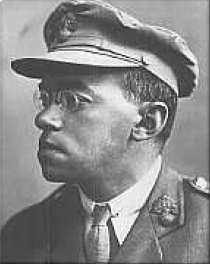
خطة إجلاء اليهود من پولندا، المجر ورومانيا
خطة الثورة على البريطانيين
الدولة المتكاملة مع العرب
وفاته
توفي في أغسطس 1940 في الولايات المتحدة بعد إصابته بأزمة قلبية وكان قد تمنى أن يتم دفنه في الدولة اليهودية التي يريد إنشاؤها. تحقق حلمه عندما خلف لڤي إشكول ديڤيد بن گوريون أشد أعداء جابوتنسكي. تم نقل رفاته ورفاة زوجته إلى قمة هرتزل سنة 1964.
ذكراه
أعماله
كتبه
- لجابوتنسكي
- Turkey and the War, London, T.F. Unwin, Ltd. [1917]
- Samson the Nazarite, London: M. Secker, [1930]
- The Jewish War Front, London: T.F. Unwin, Ltd. [1940]
- The War and The Jew, New York, The Dial Press [c1942]
- The Story of the Jewish Legion, New York, B. Ackerman, incorporated [c1945]
- The Battle for Jerusalem. Vladimir Jabotinsky, John Henry Patterson, Josiah Wedgwood, Pierre van Paassen explains why a Jewish army is indispensable for the survival of a Jewish nation and preservation of world civilization, American Friends of a Jewish Palestine, New York, The Friends, [1941]
- A Pocket Edition of Several Stories Mostly Reactionary, Tel-Aviv: Reproduced by Jabotinsky Institute in Israel, [1984]. Reprint. Originally published: Paris, [1925]
- The Five, A Novel of Jewish Life in Turn-of-the-Century Odessa: Paris, [1936]
- عن جابوتنسكي
- Lone Wolf: a Biography of Vladimir (Ze'ev) Jabotinsky, by Shmuel Katz; New York: Barricade Books, [c1996]
- Rebel and Statesman: The Vladimir Jabotinsky Story, by Joseph B Schechtman; New York, T. Yoseloff [c. 1956–1961]
- Zev Jabotinsky: Militant Fighter for Jews & Israel- Jewish Defense Organization booklet
- Jabotinsky and the Revisionist Movement, 1925–1948, by Yaacov Shavit, London, England; Totawa, N.J.:F. Cass, [1988]
- Zionism in the Age of the Dictators, Lenni Brenner, Lawrence Hill & Co; Rev Ed edition [c1983]
- Vladimir Jabotinsky, Michael Stanislawski (Introduction), [2005] ISBN 978-0-8014-8903-7
- The secret of the vision, logic and deeds (in the life of Ze'ev Jabotinsky), by Rabbi Ze'ev Sultanowitz, Jerusalem [2011]
- Vladimir Jabotinsky: The Man and His Struggles, by Joseph Nedava; Tel Aviv [1986]
- "Jabotinsky: A Life", by Hillel Halkin, Yale University Press [2014]
انظر أيضاً
مقالات وقصائد
- The East Bank of the Jordan (also known as "Two Banks has the Jordan"), a poem by Jabotinsky that became the slogan and one of the most famous songs of Betar
- Video of Jabotinsky Speaking of Jewish Eastern Palestine, 1934
- Zionism and the Land of Israel
- Tisha B'Av, 1937 at the Internet Archive
- Instead of Excessive Apology at the Internet Archive, 1911
- The Ideology of Betar
- Iron Wall (essay)
- "The Ethics of the Iron Wall", 1923
- A selection of Jabotinsky's writings: The World of Jabotinsky
- Jabotinsky translated Edgar Allan Poe's "The Raven" into Hebrew and Russian, and parts of Dante's Divine Comedy into modern Hebrew verse.
اقتباسات
- "Internationally, we will announce that those Jews who do not remove the rust of the exile from themselves and refuse to shave their beard and sidelocks (payos) will be second class citizens. They will not be given the right to vote." (From "Outside the encampment" Ha'aretz Newspaper 22 Oct 1919)
- "Our habit of constantly and zealously answering to any rabble has already done us a lot of harm and will do much more. ... We do not have to apologize for anything. We are a people as all other peoples; we do not have any intentions to be better than the rest. As one of the first conditions for equality we demand the right to have our own villains, exactly as other people have them. ... We do not have to account to anybody, we are not to sit for anybody's examination and nobody is old enough to call on us to answer. We came before them and will leave after them. We are what we are, we are good for ourselves, we will not change, nor do we want to." (From Instead of Excessive Apology, 1911)
- "Eliminate the Diaspora, or the Diaspora will surely eliminate you." (From "Tisha B'av 1937")
- A Jew brought up among Germans may assume German custom, German words. He may be wholly imbued with that German fluid but the nucleus of his spiritual structure will always remain Jewish, because his blood, his body, his physical-racial type are Jewish. ... It is impossible for a man to become assimilated with people whose blood is different from his own. In order to become assimilated, he must change his body, he must become one of them, in blood. ... There can be no assimilation as long as there is no mixed marriage. ... An increase in the number of mixed marriages is the only sure and infallible means for the destruction of nationality as such. ... A preservation of national integrity is impossible except by a preservation of racial purity, and for that purpose we are in need of a territory of our own where our people will constitute the overwhelming majority.[8]
أعماله
انظر أيضاً
المصادر
- ^ Torossian, Ronn (19 May 2014). "Jabotinsky: A Life, by Hillel Halkin - Read and Wonder". Israel National News.
- ^ Joanna Paraszczuk (28 April 2011). "A revisionist's history". The Jerusalem Post. Retrieved 25 February 2013.
Even religious Zionist settlers in the West Bank have adopted Jabotinsky as a symbol – although he was an atheist who believed that the Arabs should share equal rights with Jews in a future Jewish state, famously declaring: "In every cabinet where the prime minister is a Jew, the vice-premiership shall be offered to an Arab, and vice versa."
- ^ Michael Stanislawski (2001). "Jabotinsky's Road to Zionism". Zionism and the Fin de Siècle: Cosmopolitanism and Nationalism from Nordau to Jabotinsky. University of California Press. p. 158. ISBN 9780520935754.
In sum, just as his turn to Symbolism and Decadence in the late 1890s was typical rather than idiosyncratic, Jabotinsky's abandonment of Symbolism and Decadence was also typical rather than idiosyncratic. A thoroughgoing atheist and rationalist, he could not, to the end of his days, comprehend any mystical or religious sensibility or even any metaphysical philosophical stance, idealist or not.
{{cite book}}:|access-date=requires|url=(help) - ^ Klinger, Jerry (October 2010). "The Struggle for the Jewish Legion and The Birth of the IDF". Jewish Magazine. Retrieved 5 December 2010.
- ^ أ ب ت ث جابوتنسكي، زئيف فلاديمير من موقع مدار
- ^ ترجمة ياسين عز الدين. "اعرف عدوك: زئيف جابوتنسكي الأب الروحي لحزب الليكود واليمين الصهيوني". فلسطين نت.
- ^ ترجم: ياسين عز الدين. "ترجمة مقال زئيف جابوتنسكي - أخلاقيات الجدار الحديدي". فلسطين نت.
- ^ V. Jabotinsky, "A Letter on Autonomy", Evreiskaya zhizn no. 6, June 1904, as translated in "Israel among the nations : selection of Zionist texts" (ed. Zvi Zohar; Jerusalem : World Zionist Organization, Organization Department, Research Section, 1966). Reprinted in L. Brenner, "51 Documents", Barricade Books, 2002, pp. 7–20.
وصلات خارجية
- Memorial pages for Jabotinsky in Knesset website (إنگليزية)
- The Jabotinsky Institute {{{1}}}, {{{2}}}
- The Jabotinsky Institute (إنگليزية)
- Jewish Defense Organization runs Camp Jabotinsky, (Zionist Leaders: Ze'ev Jabotinsky, Israeli Ministry of Foreign Affairs
- Ze'ev Jabotinsky's biography Knesset website (إنگليزية)
- Law honoring Zionist forefather passed Yediot Aharonot, 23 March 2005
- Jabotinsky's biography Betar UK
- Fighting Hitler with cartoons, Haaretz
- THE JUBILEE: THE BIBLICAL PLAN FOR EXPANDED OWNERSHIP – Jabotinsky's economical view.
- CS1 errors: access-date without URL
- Pages using gadget WikiMiniAtlas
- Articles containing عبرية-language text
- Articles containing روسية-language text
- Pages using Lang-xx templates
- مواليد 1880
- وفيات 1940
- أشخاص من اوديسا
- مؤرخو اوديسا
- يهود روس
- بريطانيون مناهضون للشيوعية
- مدفونون في نيويورك
- صهاينة
- Royal Fusiliers officers
- عسكريون بريطانيون من الحرب العالمية الأولى
- كتاب عن الصهيونية
- تاريخ الصهيونية
- أعضاء المجلس الوطني اليهودي
- أعضاء مجلس النواب (فلسطين تحت الانتداب)
- أعضاء الإرگون
- أعضاء وسام الامبراطورية البريطانية
- زئڤ جابوتنسكي
- صهيونية ثورية
- مدفونون في جبل هرتسل
- ملحدون يهود
- يهود أشكناز
